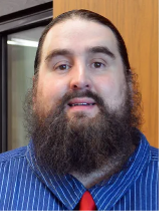
03 Jan Increased knowledge, empathy, and understanding of the transgender healthcare: Results of a medical education study
MedicalResearch.com Interview with:

Dr. Christian Carbe
Christian Carbe, PhD
Department of Medical Educatio
Geisinger Commonwealth School of Medicine
Scranton, PA 18509
MedicalResearch.com: What is the background for this study?
Response: Transgender patients often experience pronounced healthcare disparities compared to their cisgender counterparts. Disparities in the treatment of transgender patients resulting from deficiencies in cultural competency perpetuate poor health outcomes, such as suicide, substance misuse, depression, harassment, and victimization.
Individuals within the transgender community often face systemic barriers within the medical field, including a lack of comprehensive access to health insurance, discrimination from providers, and incompetent provider training in transgender-specific health needs.
This report evaluated the changes in knowledge, attitudes, and beliefs of the psychosocial and medical needs of the transgender community among first-year undergraduate medical students that attended the Northeastern Pennsylvania Trans Health Conference. Our broader goal is to develop and refine longitudinal interventions to improve skills and sensitivity of future physicians to provide compassionate and competent gender diverse and transgender healthcare.
MedicalResearch.com: What are the main findings?
Response: First-year medical students attended the Northeastern Pennsylvania Trans Health Conference which was hosted by Geisinger Commonwealth School of Medicine. Over one-third (35.2%) of first-year medical students (37/105 participants) completed both the pre- and post-survey during the first year of this project and overall, 62.5% (5/8) of survey items yielded significant differences.
One-quarter (25.5%) of first-year medical students (28/110 participants) completed both the pre- and post-survey during the second year. Almost half (9/21, 42.9%) of survey items yielded statistically significant results. While the majority of first-year medical students displayed positive attitudes toward trans people pre-intervention, the students also showed improvements in knowledge, empathy, and understanding of the transgender healthcare narrative post-intervention.
MedicalResearch.com: What should clinicians and patients take away from your report?
Response: In both intervention years, the NEPA Trans Health Conference provided all subjects (MD students) surveyed with an educational forum for healthcare professionals, their staffs, educators, and the general public to learn from the transgender community and from those who treat and support them about the necessary affirming care, respect, and understanding of people who are transgender. Medical students that receive a humanistic intervention within the medical curriculum that emphasizes the transgender person offers an important bridge between academic content and the provision of inclusive gender-affirming healthcare to all patients.
MedicalResearch.com: What recommendations do you have for future research as a result of this study?
Response: This research was completed as a single allopathic medical school. We are interested in whether these changes will occur when similar programs are implemented at other institutions or with other health care providers (DO, PA, NP, PharmD, Nursing, Genetic Counseling). We also would like to know the persistence of any benefits of this program and whether they generalize to healthcare behaviors.
MedicalResearch.com: Is there anything else you would like to add?
Response: Despite a movement to improve health care quality, clinicians continue to hold strong biases that are perpetuated by stereotypes, assumptions, and frankly misinformation, regarding the transgender narrative. Clinicians who are poorly educated or biased about gender diversity may be deliberately or accidentally discriminatory in their words or behavior.
Such clinicians can add to and perpetuate institutional and systemic discrimination leading to the denial of the existence of transgender and gender-diverse individuals, with consequential negative impacts on their health outcomes and access to competent and compassionate healthcare. Education and structured training interventions remain the most fundamental method in closing the barrier that exists in providing sustainable increases in knowledge and improvements in compassionate patient-forward care towards the transgender patient populations.
This study is novel for its ability to investigate the effects of such a unique and effective informational gathering offering numerous opportunities for meaningful conversations between the transgender community and medical students in training. It is crucial, now more than ever, that the education of a future generation of physicians optimally prepares them to provide the best possible gender affirming and compassionate care for gender-nonconforming people by partnering with local LGBTQIA2S+ leadership to design programs like the NEPA Trans Health Conference when their core curriculum lacks specific exposure. When physician providers have the gender affirming tools to effectively offer their transgender patients’ affirmation, acceptance, and medical guidance, patients feel supported during their healthcare journey.
Citation
Sengupta T, Soni T, Bolock A M, et al. (December 05, 2023) Knowledge, Attitudes, and Beliefs of Medical Students Toward Transgender Healthcare: A Community-Driven Initiative. Cureus 15(12): e49992. doi:10.7759/cureus.49992
https://www.ncbi.nlm.nih.gov/pmc/articles/PMC10697781/
The information on MedicalResearch.com is provided for educational purposes only, and is in no way intended to diagnose, cure, or treat any medical or other condition.
Some links may be sponsored. Products are not endorsed.
Always seek the advice of your physician or other qualified health and ask your doctor any questions you may have regarding a medical condition. In addition to all other limitations and disclaimers in this agreement, service provider and its third party providers disclaim any liability or loss in connection with the content provided on this website.
Last Updated on January 24, 2024 by Marie Benz MD FAAD
